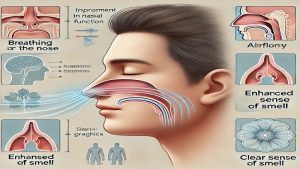Improvement of respiratory function, sense of smell and related problems
Introduction
Nose proper functioning plays an essential role in overall body health. The nose not only is the main air entry path into the respiratory tract, but also plays a role in filtering, warming and moisturizing the air before entering the lungs.. Also, the sense of smell performed by the smell in the nose plays a role in detecting odors, stimulating appetite and even creating memories.. Nasal functional problems can disrupt breathing, reduce smell and other problems such as dry mouth, snoring, frequent sinus infections, and even sleep problems.. In this article from the site of Dr. Behnam Khorrami (Isfahan nose surgeon _ Jaw surgeon of Isfahan)We examine the causes of nasal functional problems, diagnostic methods, and strategies for improving nasal function through surgical and non -surgical interventions..
Anatomy of the nose and its function
The nose is anatomically divided into three main sections:
Exterior: Asymmetrical jaws only cause problems for the person Nasal bridge, The tip of the nose and the nose blades.
Internal section: Includes the nose blade (سپتوم)، Nasal tentacles (Turbines) And the nose ducts.
The smell area: Is on the nose ceiling and contains olfactory receptor cells.
Main nose functions
breathing: Air Air to the lungs, filtering external particles, warm and moisturizing the air.
Olfactory: Diagnosis of odors through olfactory receptors.
Safety: Nose mucus and fine hair (Gray) Particles and microorganisms are trapped and prevent them from entering the respiratory tract.
Setting the pressure: Help balance pressure in the sinuses and ears.
Nose functional problems
1.. Nasal obstruction
Nasal obstruction is the most common functioning problem that can occur for the following reasons:
Deviated septum (سپتوم): Nasal blade tilting causes air passage to block.
Hyperphorfi turbines: The enlargement of nasal tentacles tightens the airway.
Nasal polyps: Abnormal tissue growth in the nasal ducts that cause obstruction.
Chronic: Allergies, chronic sinusitis or non -allergic rhinitis.
2.. Decrease or lose the sense of smell (Anosmia)
The reasons for decreasing the sense of smell include the following:
Physical obstruction: Such as polyps or septum deviation.
Viral infection: Such as colds or kuvid-1.
inflammation: Allergic rhinitis or sinusitis.
nerve damage: Head -to -head trauma or neurological diseases such as Alzheimer's.
ğ≥. Sleep and snoring problems
Nose obstruction causes oral breathing in sleep and snoring.
In severe cases, sleep apnea (Respiratory interruption) May occur.
4.. Dryness and irritation of the nasal mucosa
Over -use of nose sprays
Dry air
Sinus problems
Nasal performance strategies
1.. Correction of deviated nasal septum (ÿ≥Ÿæÿ™ŸàŸæŸÑÿßÿ≥ÿ™ğå)
The deviation of the nasal septum is one of the main causes of nasal obstruction. Septoplasty is a surgery in which the nasal septum is smooth and the breathing path opens..
Work stages:
Surgery is performed under general or local anesthesia.
A small incineration inside the nose.
The deflected parts of the nasal septum are removed or corrected.
Without external cutting and with minimal suture..
Advantages:
Improve breathing
Reduce snoring
Reduce dry mouth
2.. Reduce turbines (Engineer)
If nasal turbines (Tentacles) To be too large, the turbine is performed.
Methods:
Reduction with laser or radio frequency (RF): The extra texture burns or becomes small.
Surgical incision: Part of the turbine tissue is removed.
Advantages:
Improve airflow
Reduce nose congestion
Improving the function of the sense of smell
ğ≥. Remove the polyps (Polypectomy)
If the nasal polyp causes blocking or decreasing the sense of smell, the polypectomy is performed.
Methods:
Polyp is removed with a tool called endoscope.
Advantages:
Improve breathing
Improve the sense of smell
Reduce nasal secretions
4.. Treatment of allergic rhinitis and chronic inflammation
Steroid sprays: Reduce inflammation and swelling.
Antihistamines: Control of allergic reactions
Nose wash with salt serum: Cleaning nasal ducts of secretions and allergens
5. Treatment of Smell Sensation Problems
Opening the nose.: By surgery or medication treatment
Practice smell: The use of aromatic oils (Like eucalyptus)
Treatment of inflammation: The use of topical or oral corticosteroids
ğ∂. Treatment of dry nose
The use of air moisturizers
Use of salt sprays
Avoid long -term antisocial sprays
Post -correction of nose problems
Nose wash with salt serum to prevent dryness
Avoid hitting the nose after surgery
Take medication prescribed by your doctor's order
Regular follow-up with the doctor
Expected results after treatment
- Improvement of breathing and reducing congestion
Improve the sense of smell
Reduce snoring and improving sleep quality
Reduce sinus infections
Reducing dryness and stimulating the nose
Conclusion
Modifying nasal functional problems can have a significant impact on quality of life. Removing nasal obstruction, improving smell and resolving respiratory problems improve sleep, increase energy levels, and reduce sinuses problems.. Surgical treatments (Such as septoplasty, turbine and polypectomy) And non -surgical (Like the nasal therapy and wash) Can restore normal nasal function.
Useful links:
Isfahan nose surgeon _ Jaw surgeon of Isfahan
Dr. Behnam Khorrami's page in the clinic 24 | Maxillofacial surgeon in Isfahan clinic 24 | Nose surgeon in Isfahan clinic 24
Dr. Behnam Khorrami, nose surgeon in Isfahan at Dr. Af | Maxillofacial surgeon in Isfahan at Dr. Af | Isfahan nose surgeon at Dr. Af
